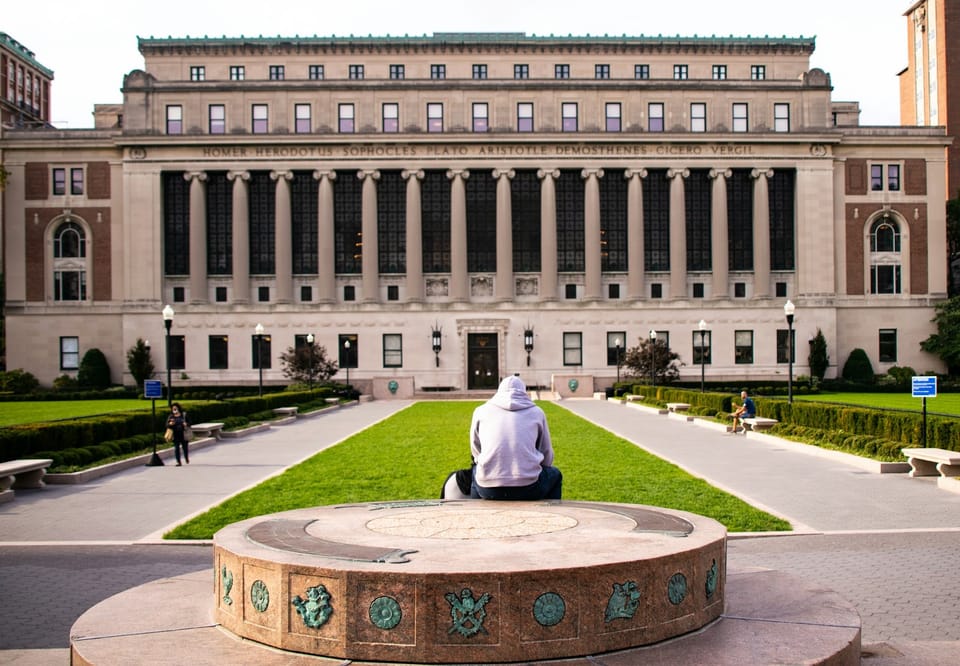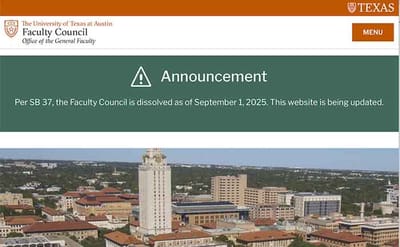Weekly War Bulletin March 23, 2025

Every Sunday I will summarize the news from the previous week’s assaults on education. There is a lot, and much of it is frankly hard to face. But I find I need to write it down to keep a running record—and to remind myself that, yes, this is really happening. (I have been writing these for my own records since February, and I will post the previous installments as my sanity allows).
The Dismantling of the Education Department
On March 20, 2025, President Trump signed an executive order directing Education Secretary Linda McMahon to begin the process of dismantling the Education Department. This unprecedented move aims to eliminate the department. By law, congressional approval is required for the abolition of the department, but this can be seen in the context of a range of executive orders and actions seeking to test the administration’s growing authority over both the legislative and judicial branch. Of course, even if the ED survives in name, it will be effectively gutted of personnel and responsibilities.
As mentioned in the last Sunday report, the justification—in keeping with longstanding criticism from the GOP dating back to the formation of the Education Department—is that this will allow education decisions to be fully restored to the states. The reality is that state control over K-12 curriculum is already largely in place, and so the impact here will be primarily felt in the administration of Pell grants and student loans and in the enforcement of civil rights laws—and in the growing expansion of state control into higher education.
There is much that remains unclear at the moment, especially regarding the management of Pell grants, vital to low income students. The plan is for the management of federal student loans to move to the Small Business Administration, which has just announced layoffs of roughly 42% of its employees. How the SBA will be equipped to manage this portfolio remains unclear, and it is even more unclear what the impact of tying loans to this agency will mean for qualifications for loans going forward. As with all things coming out of the current administration, it is difficult to guess whether the decision is random and arbitrary, or whether it speaks to a desire to tie student loans to job outcomes. My anxiety, needless to say, is that it is the latter, which could eventually make it harder or impossible for students majoring in fields not directly tracked to specific career outcomes to secure student loans. The impact for the Arts & Humanities in particular would be catastrophic, even if this connection were to remain only implied.
The dismantling of the Department of Education will have major impacts on civil rights enforcement. Trained and experienced investigators working in this space are now replaced by operatives at the Department of Justice. In a different timeline that might not be a disaster. But everything we have seen in the opening weeks of this administration suggests that the independence so vital to the mission of the DOJ is sacrificed to the will of the current President. Prosecutions against corrupt allies have been dropped to reward loyalty, while the DOJ has actively rewarded any and all demonstrating loyalty to the president, beginning with the blanket pardons on January 20th for defendants and those convicted for a range of crimes committed during the January 6th assault on the Capitol. The following day, “Operation Whirlwind” was declared, dedicated to using the DOJ to investigate any who made statements interpreted as threats against Elon Musk and to prosecute all who interfered with Musk’s DOGE. A week after the inauguration, all prosecutors who had worked on the January 6 investigations were purged from the DOJ. And that was only week 1.
The disruptions, at best, of processes governing Pell Grants and the collapse of the Department of Education’s Civil Rights office represent profound threats to equitable access to higher education for low-income and other underrepresented populations. Of course, it goes without saying that this is a feature and not a bug. The attack on higher education now underway is part of a larger project to reduce the influence of universities, restrict access, and use federal power to severely limit what can be taught and studied. The shuttering of the Education Department will remove a significant obstacle to swift achievement of those goals.
A Devastating Surrender
It is very much the rhetoric of the day among faculty that concessions to the federal government (and in the case of Red States, the state legislatures) represents cowardice and capitulation akin to Chamberlain in 1938. I would argue strenuously that much of those arguments are not only unfair but threaten to weaken the universities who are quite literally fighting for their lives. That said, of course, some capitulations are indeed acts of cowardice, just as some acts of “resistance” are performative theater that puts nothing at risk. More on this as the war continues.
For now, the big story of the week, and a devastating blow to those hoping that well-endowed private institutions would be in a position to stand firm against intimidation, was Columbia’s surrender to the Trump administration’s demands discussed last week. In an unsigned letter from the university’s administration, they gave almost everything the White House had demanded: adopting a definition of antisemitism, placing the process for student conduct investigations under direct supervision of the provost and president, and placing the Middle Eastern, South Asian and African Studies Department under the control of a senior vice provost.
It is hard not to be shocked and profoundly by the speed and the extent of this capitulation to demands that fly in the face of academic freedom and institutional autonomy. It is certain to send a chill through universities across the country, especially those (my own included) who currently find themselves on government watch lists.
Unlike so many other institutions, I have a harder time believing Columbia was facing an existential threat requiring immediate surrender. That said, in addition to the $400 million federal research grants already frozen, up to $2 billion more were being threatened should compliance not be forthcoming. In a normal world it would be easy to be skeptical of such threats, as blows to federal research would be as much against the interests of the nation as the university (which is why such partnerships exist, after all). But these are not normal times, and the dismantling of the federal research system shows that the hostility to higher education is matched by that directed against research itself.
This, I confess, continues to bring me up short. There are generations of conservative rhetoric, going back to Buckley’s God and Man at Yale, that can be used to justify the hostility to higher education. The war on research itself I just did not see coming. Yes, many expected to see federal indirect costs reduced, in keeping with longstanding GOP concern with government overspending. But the extent of the blow to federal research programs expanded beyond any pretext of financial efficiency or even the self-proclaimed “war on woke.” As of this writing, billions of dollars in research projects at the NIH alone are stalled. Terabytes of data in numerous agencies is being disappeared.
From this perspective one can perhaps better understand Columbia’s capitulation as inevitable, but it is hard to justify the speed and completeness of the surrender. Columbia’s endowment was reported at 14.8 billion at the end of fiscal year 2024, the 8th largest in the country. Unlike the vast majority of universities, Columbia had resources to push back, to negotiate, or, better yet, to challenge in court the arbitrary use of executive power. All of higher education is infinitely weaker as a result of Columbia’s acquiescence. And all of us can expect a federal administration emboldened to expand its campaign using similar tactics.
The halting of $175 million in funds at the University of Pennsylvania is a case in point. On February 5, Trump had signed an executive order titled “Keeping Men Out of Women’s Sports.” One day later the administration announced an investigation of the University of Pennsylvania for allowing swimmer Lia Thomas to compete in 2022, despite the fact that NCAA rules at the time allowed her to participate. What the administration’s demands to Penn will be remains unclear, especially since they are targeting Penn for events that happened previous to the executive order or the NCAA changes in rules that followed.
Other universities are preparing for their own attacks. Following high profile protests and confrontations at UCLA in April, there is good reason to believe the Cal system will be facing the interrogation room soon. On March 19, UC President Michael V. Drake announced a system-wide hiring freeze and cost-cutting measures. Even absent direct targeting of additional cuts by the Trump administration, the UC system is already facing massive financial challenges due to reductions in federal offsets from NIH grants and a major reduction in state support announced in January. If California is indeed next in the bullseye of the administration, it will be the first major public system to find itself on the frontlines of this current war. All of us at state institutions will be watching closely.
Deporting Scholars
These weekly updates can never be comprehensive, so fast and furious is the news from the war on higher education. But I can’t conclude this week’s dispatches without acknowledging that Mahmoud Khalil remains incarcerated in Louisiana, fighting deportation for his legal activities protesting Israel’s war on Gaza. Since Khalil’s arrest, other academics have found themselves caught in the administration’s efforts to turn the force of immigration law on those who are in the country legally and who have been charged with no crime but exercising their First Amendment rights.
Badar Khan Suri, an Indian academic at Georgetown on a student visa, was accused by Homeland Security of “actively spreading Hamas propaganda and promoting antisemitism on social media.” As Tricia McLaughlin, Homeland Security spokesperson, posted on X:
Suri has close connections to a known or suspected terrorist, who is a senior advisor to Hamas. The Secretary of State issued a determination on March 15, 2025 that Suri’s activities and presence in the United States rendered him deportable under INA section 237(a)(4)(C)(i).
Section 237(a)(4)(C)(i) of the Immigration and Nationality Act is a provision that renders an alien deportable if the Secretary of State has reasonable ground to believe that the alien's presence or activities in the United States would have potentially serious adverse foreign policy consequences for the United States. It was designed to authorize deportation of legal residents for serious crimes such as espionage or terrorist activities. It was most certainly not intended to target legal residents engaged in protests or social media discourse, and attempts to use it against legal residents exercising their right to free speech have been blocked by the courts in the past. We can only hope they will be this time, but of course in 2025 the question remains unanswered as to whether the administration will comply with any court orders.
What makes Suri’s case all the more appalling is that, unlike Khalil and other academics targeted for deportations, Suri was not active in the protests or on social media. In fact it is quite clear that it is not Suri but his wife who is the object of the government’s ire. His father-in-law is Ahmed Yousef, a former Hamas advisor who left the government a decade ago and is himself on record as having condemned the October 7th Hamas attacks on Israel. None of this matters to the administration of course, as there is no interest in due process or even meaningful cause involved here.
There is little reason to believe the war on higher education will ease up anytime soon, especially after the Columbia University surrender. The question for all of us to ask ourselves as we face a protracted struggle ahead is whether we is willing to work together—faculty, students, staff, administrators, and boards—to defend our values, our academic freedom, our institutional autonomy, and our students’ futures. Doing so will require setting aside traditional animosities and distrust—particularly between faculty and administration. We can pick up those squabbles later. Failing to set them aside now, I fear, will put everything at risk.
Subscribe (always free)
Subscribe (free!) to receive the latest updates






Member discussion